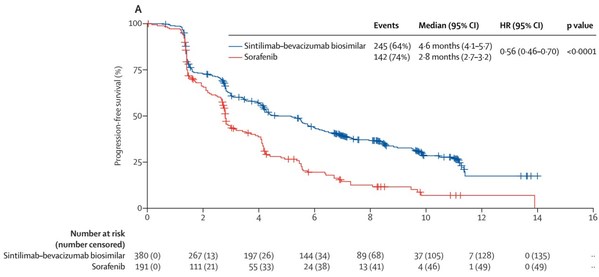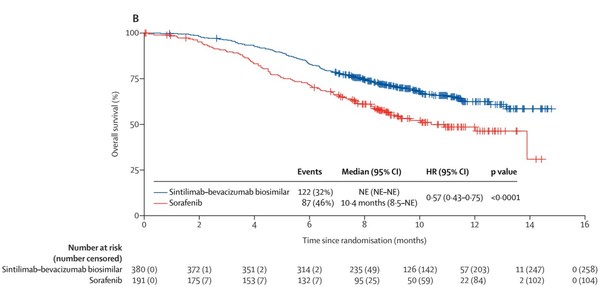Study Results of Sintilimab in Combination with Bevacizumab Biosimilar IBI305 for the First-Line Treatment of Hepatocellular Carcinoma Published in The Lancet Oncology
SAN FRANCISCO and SUZHOU,China,June 21,2021 --Innovent Biologics,Inc. ("Innovent") (HKEX: 01801),a world-class biopharmaceutical company that develops,manufactures and commercializes high quality medicines for the treatment of cancer,metabolic,autoimmune and other major diseases,today announced that data from the ORIENT-32 study have been published in The Lancet Oncology.
Led by Professor Fan Jia from Zhongshan Hospital of Fudan University,ORIENT-32 is a Phase 2/3 randomized,open label,multi-center study conducted in China to evaluate the efficacy and safety of sintilimab in combination with the bevacizumab biosimilar IBI305 compared to sorafenib in the first-line treatment of patients with advanced hepatocellular carcinoma (HCC).
In January 2021,theNational Medical Products Administration (NMPA) of China accepted the supplemental New Drug Application (sNDA) for sintilimab in combination with bevacizumab biosimilar as first-line therapy for patients with HCC.
Professor Fan Jia stated: "ORIENT-32 is the first large-scale study to show the benefit of first-line treatment in HBV-associated HCC with combination immunotherapy. Despite the COVID-19 pandemic,the collaborative joint effort of the ORIENT-32 trial investigators and patients enabled us to successfully reach this milestone. We hope these results can help to provide a new treatment option for patients with hepatocellular carcinoma."
Dr. Zhou Hui,Senior Vice President of Clinical Development of Innovent,stated: "ORIENT-32 is the first hepatocellular carcinoma study in the world of a PD-1 inhibitor-based combination therapy to achieve its primary endpoint of overall survival. We are pleased that these study results have been published in The Lancet Oncology and hope to bring this regimen as a new treatment option for Chinese patients with hepatocellular carcinoma in the near future. Moreover,we are encouraged that our development of cancer therapies is helping to achieve the Healthy China 2030 goal."
About the ORIENT-32 Study
Background
China has a high burden of hepatocellular carcinoma (HCC),with chronic hepatitis B virus (HBV) infection as the major cause. People with HCC have a poor prognosis and a substantial unmet clinical need1. The ORIENT-32 study assessed sintilimab in combination withbevacizumab biosimilar,compared to sorafenib,in the first-line treatment of patients with unresectable HBV-associated HCC.
Methods
This randomized,open label study was conducted at 50 clinical trial sites in China. Patients aged 18 years or older with histologically or cytologically diagnosed or clinically confirmed unresectable or metastatic HCC with no previous systemic treatment and a baseline Eastern Cooperative Oncology Group (ECOG) performance status of 0 or 1 were eligible for inclusion.
In the safety lead-in phase,patients received intravenous sintilimab (200 mg every 3 weeks) plus intravenous bevacizumab biosimilar (15 mg/kg every 3 weeks). In the Phase 3 study,patients were randomly assigned (2:1) to receive either sintilimab plus bevacizumab biosimilar(the sintilimab–bevacizumab biosimilar group) or sorafenib (400 mg orally twice daily; the sorafenib group),until disease progression or unacceptable toxicity. Randomization was done using permuted block randomization,with a block size of six,via an interactive web response system,and stratified by macrovascular invasion or extrahepatic metastasis,baseline α-fetoprotein,and ECOG performance status. In the lead-in phase of the study,safety was assessed in all patients who received at least one dose of study drug. After reviewing the safety findings from the safety lead-in phase,the study was conducted with the primary endpoints of overall survival (OS) and independent radiological review committee (IRRC)-assessed progression-free survival (PFS) according to Response Evaluation Criteria in Solid Tumors (RECIST) version 1.1 in the intention-to-treat population. The study is registered with ClinicalTrials.gov,NCT03794440.
The study is closed to new participants and follow-up is ongoing for long-term outcomes.
Findings
Between February 11,2019 and January 15,2020,595 patients were enrolled: 24 were enrolled directly into the safety lead-in component and 571 were randomly assigned to receive the sintilimab–bevacizumab biosimilar combination (n=380) or sorafenib (n=191). 24 patients received at least one dose of the study drug,with an objective response rate of 25.0 percent (95% CI 9.8–46.7). Based on the preliminary safety and activity findings of the lead in portion,in which ≥grade 3 treatment-related adverse events (TRAEs) occurred in seven (29%) of 24 patients,the randomized portion was initiated.
At data cutoff (August 15,2020),the median follow-up was 10.0 months (IQR 8.5–11.7) in the sintilimab–bevacizumab biosimilar group and 10.0 months (8.4–11.7) in the sorafenib group. Patients in the sintilimab–bevacizumab biosimilar group had a significantly longer IRRC-assessed median PFS (4.6 months [95% CI 4.1–5.7]) than did patients in the sorafenib group (2.8 months [2.7–3.2]; stratified hazard ratio [HR] 0.56,95% CI 0.46–0.70; p<0.0001).

Figure A: Kaplan–Meier analysis of IRRC-assessed progression-free survival according to RECIST version 1.1[2]

Figure B: overall survival in the intention-to-treat population[3]
In the first interim analysis of OS,patients in the sintilimab–bevacizumab biosimilar group showed a significantly longer median OS than did patients in the sorafenib group (median not reached [95% CI not reached–not reached] vs 10.4 months [8.5–not reached]; HR 0.57,95% CI 0.43–0.75; p<0.0001).
The most common grade 3–4 TRAEs were hypertension (55 [14%] of 380 patients in the sintilimab–bevacizumab biosimilar group vs. 11 [6%] of 191 patients in the sorafenib group) and palmar-plantar erythrodysaesthesia syndrome (none vs. 22 [12%]). 123 (32%) patients in the sintilimab–bevacizumab biosimilar group and 36 (19%) patients in the sorafenib group had serious adverse events. TRAEs that led to death occurred in six (2%) patients in the sintilimab–bevacizumab biosimilar group and two (1%)patients in the sorafenib group.
Conclusions
Sintilimab in combination with bevacizumab biosimilar IBI305 showed significant improvements in OS and PFS compared to sorafenib in the first-line treatment of Chinese patients with unresectable,HBV-associated HCC,with no new safety signals. This combination regimen could provide a novel treatment option for such patients.
Link to the ORIENT-32 publication in The Lancet Oncology: https://www.thelancet.com/journals/lanonc/article/PIIS1470-2045(21)00252-7/fulltext
About Hepatocellular Carcinoma
Primary liver cancer (PLC) is a common malignancy of the digestive system worldwide,among which about half of all new cases and deaths occur in China. The main pathological types of liver cancer are hepatocellular carcinoma (HCC),which accounts for 85 to 90 percent,and a small number of cases of intrahepatic cholangiocarcinoma (ICC) and HCC-ICC mixed liver cancer. In China,HCC is primarily caused by hepatitis B virus (HBV) and/or hepatitis C virus (HCV) infection.
About Sintilimab
Sintilimab,marketed as TYVYT® (sintilimab injection) in China,is an innovative PD-1 inhibitor with global quality standards jointly developed by Innovent and Eli Lilly and Company. Sintilimab is an immunoglobulin G4 monoclonal antibody,which binds to PD-1 molecules on the surface of T-cells,blocks the PD-1 / PD-Ligand 1 (PD-L1) pathway,and reactivates T-cells to kill cancer cells. Innovent is currently conducting more than 20 clinical studies of sintilimab to evaluate its safety and efficacy in a wide variety of cancer indications,including more than 10 registrational or pivotal clinical trials.
In China,sintilimab has been approved for three indications,including:
The treatment of relapsed or refractory classic Hodgkin's lymphoma after two lines or later of systemic chemotherapy
In combination with pemetrexed and platinum chemotherapy,for the first-line treatment of nonsquamous non-small cell lung cancer
In combination with gemcitabine and platinum chemotherapy,for the first-line treatment of squamous non-small cell lung cancer
Additionally,Innovent currently has regulatory submissions under review in China for sintilimab:
In combination with BYVASDA® (bevacizumab injection) for the first-line treatment of hepatocellular carcinoma
The second-line treatment of squamous non-small cell lung cancer
In May 2021,the U.S. FDA accepted for review the Biologics License Application (BLA) for sintilimab in combination with pemetrexed and platinum chemotherapy for the first-line treatment of nonsquamous non-small cell lung cancer.
Sintilimab was included in China's National Reimbursement Drug List (NRDL) in 2019 as the first PD-1 inhibitor and the only PD-1 included in the list in that year.
About BYVASDA® (bevacizumab biosimilar injection)
BYVASDA®,also known as IBI305,is a bevacizumab biosimilar and a recombinant humanized anti-VEGF monoclonal antibody drug. Vascular endothelial growth factor (VEGF) is an important factor in angiogenesis that is highly expressed by the endothelial cells in most human tumors. An anti-VEGF antibody binds VEGF-A selectively with high affinity and blocks its binding to VEGF-2 receptors on the surface of vascular endothelial cells,thereby inhibiting signaling pathways such as PI3K-Akt/PKB and Ras-Raf-MEK-ERK. BYVASDA® produces anti-tumor effects by inhibiting the growth,proliferation and migration of vascular endothelial cells,blocking angiogenesis,reducing vascular permeability,blocking blood supply to tumor tissues,inhibiting the proliferation and metastasis of tumor cells and inducing apoptosis in tumor cells. Since its launch,bevacizumab has been approved for the treatment of patients with multiple malignant tumors globally,including non-small cell lung cancer,metastatic colorectal cancer,glioblastoma,renal cell carcinoma,cervical cancer,and epithelial ovarian,fallopian tube,or primary peritoneal cancer. The efficacy and safety of bevacizumab in these tumor types have been well recognized worldwide.
BYVASDA® (bevacizumab biosimilar injection) was firstly approved by the China NMPA on June 17,2020. Approved indications of BYVASDA® include advanced non-small cell lung cancer and metastatic colorectal cancer. In December 2020,it was also approved by the NMPA for the indication of adult recurrent glioblastoma.
About Innovent
Inspired by the spirit of "Start with Integrity,Succeed through Action," Innovent's mission is to develop,manufacture and commercialize high-quality biopharmaceutical products that are affordable to ordinary people. Established in 2011,Innovent is committed to developing,manufacturing and commercializing high-quality innovative medicines for the treatment of cancer,autoimmune,metabolic and other major diseases. On October 31,2018,Innovent was listed on the Main Board of the Stock Exchange of Hong Kong Limited with the stock code: 01801.HK.
Since its inception,Innovent has developed a fully integrated multi-functional platform which includes R&D,CMC (Chemistry,Manufacturing,and Controls),clinical development and commercialization capabilities. Leveraging the platform,the company has built a robust pipeline of 24 valuable assets in the fields of cancer,autoimmune disease and other major therapeutic areas,with 4 products – TYVYT® (sintilimab injection),BYVASDA® (bevacizumab biosimilar injection),SULINNO® (adalimumab biosimilar injection) and HALPRYZA® (rituximab biosimilar injection) – officially approved for marketing in China,sintilimab's Biologics License Application (BLA)acceptance in the U.S.,6 assets in Phase 3 or pivotal clinical trials,and an additional 14 molecules in clinical studies.
Innovent has built an international team with advanced talent in high-end biological drug development and commercialization,including many global experts. The company has also entered into strategic collaborations with Eli Lilly and Company,Adimab,Incyte,MD Anderson Cancer Center,Hanmi and other international partners. Innovent strives to work with many collaborators to help advance China's biopharmaceutical industry,improve drug availability and enhance the quality of the patients' lives. For more information,please visit: www.innoventbio.com.
Note:
Sintilimab is not an approved product in the United States.
BYVASDA® (bevacizumab biosimilar injection),HALPRYZA® (rituximab biosimilar injection),andSULINNO® (adalimumab biosimilar injection) are not approved products in the United States.
TYVYT® (sintilimab injection,Innovent)
BYVASDA®(bevacizumab biosimilar injection,Innovent)
SULINNO® (adalimumab biosimilar injection,Innovent)
Innovent Biologics,Inc. Forward-Looking Statements
This news release may contain certain forward-looking statements that are,by their nature,subject to significant risks and uncertainties. The words "anticipate","believe","estimate","expect","intend" and similar expressions,as they relate to Innovent,are intended to identify certain of such forward-looking statements. Innovent does not intend to update these forward-looking statements regularly.
These forward-looking statements are based on the existing beliefs,assumptions,expectations,estimates,projections and understandings of the management of Innovent with respect to future events at the time these statements are made. These statements are not a guarantee of future developments and are subject to risks,uncertainties and other factors,some of which are beyond Innovent's control and are difficult to predict. Consequently,actual results may differ materially from information contained in the forward-looking statements as a result of future changes or developments in our business,Innovent's competitive environment and political,economic,legal and social conditions.
Innovent,the Directors and the employees of Innovent assume (a) no obligation to correct or update the forward-looking statements contained in this site; and (b) no liability in the event that any of the forward-looking statements does not materialize or turn out to be incorrect.
11. Chen W,Zheng R,Baade PD,et al. Cancer statistics in China,2015; CA Cancer J Clin 2016; 66: 115-32.
2. Xie DY,Ren ZG,Zhou J,Fan J,Gao Q. 2019 Chinese clinical guidelines for the management of hepatocellular carcinoma: updates and insights. Hepatobiliary Surg Nutr. 2020 Aug;9(4):452-463. doi: 10.21037/hbsn-20-480.
2,3 Reprinted from The Lancet,https://doi.org/10.1016/S1470-2045(21)00252-7,Prof Zhenggang Ren,MD,Prof Jianming Xu,Prof Yuxian Bai,Prof Aibing Xu,Prof Shundong Cang,Prof Chengyou Du,et al.,Sintilimab plus a bevacizumab biosimilar (IBI305) versus sorafenib in unresectable hepatocellular carcinoma (ORIENT-32): a randomised,open-label,phase 2–3 study,Copyright (2021),with permission from Elsevier